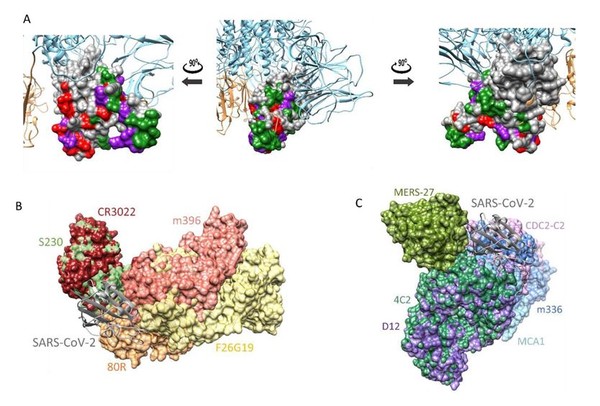A group of Korean researchers reported Wednesday that medical workers can find and use an antibody to treat the new coronavirus, from the antibodies of Severe Acute Respiratory Syndrome and Middle East Respiratory Syndrome.
Two SARS-neutralizing antibodies and one MERS-neutralizing antibody can combine with COVID-19's spike protein, said the researchers, who belong to the Center for Convergent Research of Emerging Virus Infection under the Korea Research Institute of Chemical Technology (KRICT).
Spike protein is a protein used by coronavirus for infiltrating into cells. If patients are injected with antigens through vaccines that use antibodies that neutralize SARS and MERS virus, the human body can form antibodies through immunizing response and neutralize pathogens, they explained.

The researchers have confirmed similarities between SARS and COVID-19 viruses through genome analysis of the latter and predicted whether SARS and MERS neutralizing antibodies can combine with COVID-19, through bioinformatics analysis. The team acquired a separate COVDI-19 strain from the Korea Centers for Disease Control and Prevention, and secured COVID-19’s RNA by swiftly culturing the virus at KRICT.
The research team used the RNA and compared the sensitivity of primer and probe set for detecting the COVID-19 virus published overseas. Primer is a short gene sequence that becomes the starting point of specific genetic synthesis. The probe is a short fluorescent genetic sequence that reads particular genetic amplification in real-time.
As a result, the research team found higher detection sensitivity in 2019-nCOV, N2, and N3 assays in the United States and NⅡD_2019-nCOV_N assays in Japan under the same condition.
"The institute will spare no support to develop COVID-19 virus diagnostic technique, vaccine, and medicine development," KRICT President Lee Mi-hye said. "We will continue to work to treat infectious diseases connected closely to public health."
The study results were published in the biological science archive, bioRxiv, on Wednesday.

